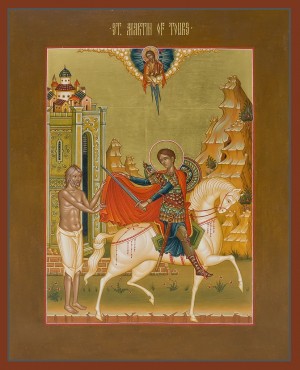
On our nation’s secular calendar, November 11 is celebrated as Veterans Day, honoring military veterans of the United States Armed Forces. The holiday was originally established as Armistice Day, commemorating the end of World War I on November 11, 1918. It was renamed Veterans Day in 1954, changing its focus from celebrating peace to celebrating military service.
But on the Church’s calendar, November 11 is the feast of St. Martin of Tours (316-397), who is recognized as one of the Church’s first conscientious objectors.
During the Church’s first few centuries, Church teaching forbade Christians from serving in the military. The pervasive presence of idolatry in the military was one reason, but the primary reason was opposition to killing of any kind. Church writers cited Jesus’ commands to love one’s enemies and to turn the other cheek, as well as his rebuke to the disciple who drew his sword in the Garden of Gethsemani. (Ronald J. Sider, The Early Church on Killing: A Comprehensive Sourcebook on War, Abortion, and Capital Punishment, 2012, pp. 175-77.)
During this period, members of the military who wanted to become Christian were allowed to receive catechetical training, provided they renounced killing. They were not required to leave military service immediately, which would have been very difficult and costly, and many Roman soldiers never fought in military campaigns. (Ibid., 192-93.)
Martin’s father, a pagan, was an officer in the Roman army, and Martin was required to join the army at age 15. According to Butler’s Lives of the Saints,
"When he was about twenty [and a catechumen], there was a barbarian invasion of Gaul. With his comrades he appeared before Julian Caesar to receive a war-bounty, and Martin refused to accept it. 'Hitherto,' he said to Julian, 'I have served you as a soldier; let me now serve Christ. Give the bounty to these others who are going to fight, but I am a soldier of Christ and it is not lawful for me to fight.' Julian stormed and accused Martin of cowardice, who retorted that he was prepared to stand in the battle-line unarmed the next day and to advance alone against the enemy in the name of Christ. He was thrust into prison, but the conclusion of an armistice stopped further developments and Martin was soon after discharged."
Martin went on to study theology under St. Hilary of Poitiers, founded the first monastery in Gaul, and later served as bishop of Tours.
Christianity became the official religion of the Roman Empire in 380, and Christian pacifism gave way to the just war tradition as the Church’s main philosophical approach to issues of war and peace. Modern-day conscientious objectors like Ben Salmon, imprisoned by the U.S. for refusing to serve in World War I, and Bl. Franz Jägerstätter, executed by the Nazis for refusing to serve in World War II, found no support for their pacifism from their Church leaders.
But in 1965, the Second Vatican Council officially endorsed pacifism as a legitimate stance for Catholics. In Gaudium et Spes (the Pastoral Constitution on the Church in the
Modern World), the Council wrote, “We cannot fail to praise those who renounce the use of violence in the vindication of their rights . . . . Moreover, it seems right that laws make humane provisions for the case of those who for reasons of conscience refuse to bear arms, provided however, that they agree to serve the human community in some other way” (¶¶ 78-79).
In The Challenge of Peace: God’s Promise and Our Response (1983), the U.S. Bishops wrote, “It is incumbent upon us to stress to our own community and to the wider society the significance of this support for a pacifist option for individuals in the teaching of Vatican II and the reaffirmation that the popes have given to nonviolent witness since the time of the council” (¶ 119). The bishops also noted their support “for legislative provision to recognize selective conscientious objectors” (¶ 118), i.e., individuals who object on moral grounds to specific wars, even if they are not opposed in principle to all wars.
On this November 11, then, let us pray for those who served their country in uniform. Pray also for an end to all wars. And, remembering St. Martin of Tours, pray for those who refuse military service for the sake of the gospel.
Image: Icon of St. Martin as a soldier sharing his cloak with a beggar, by Fr. Igumen Silouan of the Monastery of Our Lady of Mercy in New York City, licensed under CC BY-NC-ND 2.0.
This article first appeared in the November 2025 issue of the monthly newsletter of St. John Neumann Catholic Church, Reston, Virginia.



